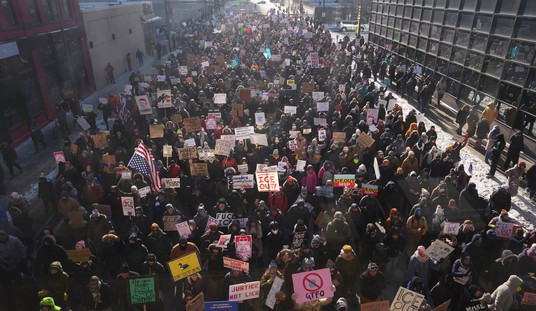Here we go again. Recall that the Obama administration chose to indict Osama bin Laden’s son-in-law in civilian federal court for the 9/11 attacks and the overarching al Qaeda conspiracy to kill Americans — thus undermining the military commission case at Gitmo against Khalid Sheikh Mohammed and the other 9/11 attackers. Now we learn that the civilian court rules are being bent so that the accused terrorist, Sulaiman Abu Ghaith, is permitted to retain a lawyer beset by serious conflicts of interest that will create significant appellate issues even if Abu Ghaith is convicted.
At the New York Times, Ben Weiser reports that Abu Ghaith was initially given representation by the Legal Aid Society’s public defender’s office when he was arraigned on the charges in Manhattan federal court in March. This is standard procedure.
The Sixth Amendment right to counsel is not right to counsel of one’s choice; it is a right to competent representation. Defendants who cannot afford to hire their own lawyers are represented by Legal Aid or, if the public defender is conflicted (usually because the case involves multiple defendants and a lawyer is only supposed to represent one), by a private defense lawyer off a panel organized under the federal Criminal Justice Act. And even defendants well-heeled enough to hire their own lawyers do not have an unlimited right to counsel of their choice. They have no right to representation by, for example, a non-lawyer, an incompetent lawyer (e.g., one not versed in the criminal law), or a lawyer not admitted to practice before the court where the defendant is indicted. More to the point, there is no right to representation by a lawyer who is saddled with conflicts of interest — either because he has represented other people relevant to the case (e.g., other defendants, coconspirators, or potential witnesses) or because he has had his own run-ins with the law. Such a lawyer will be barred from participating in the case unless the court finds that (a) the conflict is attenuated enough that it can be waived and (b) the defendant has waived it knowingly, intelligently, and voluntarily.
In my experience, these are the worst kind of issues for a prosecutor to litigate. The prosecutor is obliged to make a vigorous argument that the conflict is likely to sow reversible error into the trial. I have always believed there are too many unknowns before a long, complex, unpredictable trial for a waiver of a conflict to be knowing and intelligent — and a person cannot be said to waive voluntarily something that cannot realistically be understood at the time of the waiver. Maybe it will turn out that a former client of the lawyer will become an important trial witness for the government — and the lawyer, because of his continuing obligation of fealty to the former client, will not be able to conduct cross-examination. Or, if the lawyer is being investigated by the government for his own wrongdoing, maybe developments in that investigation will give the lawyer a powerful incentive to please the prosecutors — i.e., the lawyer may go easy on the government’s case against the client in hopes that the government will refrain from charging the lawyer or will give the lawyer a favorable plea-bargain.
The prosecutor in the terrorism case must explain these possible scenarios in detail to the court in arguing that the lawyer should be disqualified. But even as the prosecutor makes his argument, he knows he is basically writing the defendant’s appellate brief for him. The defendant, of course, wants the trial record to be riddled with error, since that is his best chance of getting any eventual conviction reversed. So prior to trial he says the prosecutor is absolutely wrong, that he fully understands the potential conflicts, and that he desperately wants the conflicted lawyer anyway. Then, after he has been convicted, the defendant tells the appellate court that the prosecutor was absolutely right, that there was no way he could have foreseen all the ways the conflicts would compromise the lawyer’s ability to render competent representation, and that the conviction must be reversed for precisely the reasons the prosecutor warned about prior to trial.
This is why a judge should never gratuitously invite this kind of error into a case. When a judge decides the lawyer must be disqualified because the case is too complex for the conflict to be waived knowingly, there is no way the appellate court will reverse that decision. On appeal, the only real question will be whether the unconflicted lawyer who ended up representing the defendant was competent. If he was, then the essence of the Sixth Amendment has been satisfied and there is no reason to reverse the conviction — certainly not for failure to permit representation by a conflicted lawyer who almost certainly would not have been more competent.
Yet gratuitously inviting error is exactly what Judge Lewis A. Kaplan has done in the Abu Ghaith prosecution. Abu Ghaith announced that he wanted to retain Stanley L. Cohen, an attorney who — like Bill Kunstler, Lynne Stewart and other self-styled “political” (which is to say, radical) lawyers — has represented many anti-American terrorists. Cohen, however, is in steaming hot water. He is under indictment in one federal district for obstructing the IRS. And in the Southern District of New York (SDNY), whose U.S. attorney is in charge of the Abu Ghaith prosecution, Cohen is under investigation for criminal tax violations (and in federal procedure, such investigations must be approved by Justice Department headquarters, which, it should be noted, assigned Abu Ghaith’s case to the SDNY).
This should have been an easy call. There are a zillion lawyers in New York with no conflicts of interest that would bear on Abu Ghaith’s case. You simply tell the defendant to find one of them to represent him and, if he cannot, that the court will assign an unconflicted lawyer at taxpayer expense. But no … Judge Kaplan instead has decided to allow Abu Ghaith to retain Cohen, reasoning that any “potential conflicts” have been “knowingly and voluntarily waived.”
After learning of the ruling, Cohen crowed, “A large population in the world does not believe that in this day and age Abu Ghaith can ever receive justice in a courtroom in New York City. Granting his request to proceed to trial with counsel of his choice is the first step.” This is ridiculous. First, the federal courts are obliged to serve the American people, not “a large population of the world”; the American people have a right to a just, efficient trial under the normal rules — not to have a judge roll the dice and risk the necessity of a second trial just so we can hope to impress “a large population of the world” that does not believe American courts administer justice. Second, even if we were in the business of such symbolism, it doesn’t work. One of the top items on the Islamic-supermacist grievance agenda is the imprisonment of the Blind Sheikh (Omar Abdel Rahman, whom I prosecuted in the early-to-mid nineties). The fact that he was given a civilian trial with scrupulous adherence to due process protections and is being held, not at Gitmo, but in a civilian prison that ministers fastidiously to his various medical needs matters not a wit to the people Cohen would have us impress. They still riot and commit other atrocities to try to extort his release and repatriation to Egypt.
Judge Kaplan, it should be noted, presided over the last big al Qaeda trial in the SDNY, the 2010 case against Ahmed Ghailani for his involvement in the 1998 bombings of the American embassies in Kenya and Tanzania. In that case, Judge Kaplan refused to permit the government to call its most important witness. Ghailani ended up being acquitted on 284 of 285 counts — although he was sentenced to life-imprisonment on the single count of conviction, so the Obama Justice Department puts that one in the win column in its campaign to return us to the pre-9/11 days of treating all terrorist atrocities as crimes rather than acts of war.









Join the conversation as a VIP Member